Catcholic catechism teaches:
1333 At the heart of the Eucharistic celebration are the bread and wine that, by the words of Christ and the invocation of the Holy Spirit, become Christ's Body and Blood.
1376 The Council of Trent summarizes the Catholic faith by declaring: "Because Christ our Redeemer said that it was truly his body that he was offering under the species of bread, it has always been the conviction of the Church of God, and this holy Council now declares again, that by the consecration of the bread and wine there takes place a change of the whole substance of the bread into the substance of the body of Christ our Lord and of the whole substance of the wine into the substance of his blood. This change the holy Catholic Church has fittingly and properly called transubstantiation."
1377 The Eucharistic presence of Christ begins at the moment of the consecration and endures as long as the Eucharistic species subsist. Christ is present whole and entire in each of the species and whole and entire in each of their parts, in such a way that the breaking of the bread does not divide Christ.
Thus we see that catholic denomination teaches us to imagine that after some special prayer of priest the wafer transforms into God and that in some miraculous way there is Jesus Christ in that wafer. It is explained that the bread after consecration become body of Christ and the wine after consecration become blood of Christ. This process is called transubstantiation and these transformed things are called the Most Holy sacrament. It is explained also that consuming of these holy things somehow gives us strength to withstand sin and draws us closer to God.
If we read the Word of God attentively, we see that such teaching is not true. There is no God in grape juice; there is no God in a piece of bread. Neither bread nor wine or juice can be transformed into God, notwithstanding how holy living is a priest and how much time he prays for it.
I believe that there are no impossible things for mighty God. Maybe, he could do even such transformations, but he never gave such a promises therefore it does not happen.
Catholic denomination teaches that material things, bread and wine, must be worshiped like God.
If you knew Lithuanian, you could read in the site of Vilnius Cathedral:
Most Holy Sacrament of the altar - it is the sacrament of sacraments, the most important visible sign of God's presence. During Saint Mass consecrated (specially blessed) bread of the Eucharist, which is stored in the tabernacle (specially equipped ornate small house) is called the Most Holy Sacrament.
Tabernacle is in the Chapel of Most Holy Sacrament in Vilnius Cathedral. Constantly lit small red eternal lamp near the tabernacle is a sign that the Most Holy Sacrament is stored here: Jesus Christ's true Body and Blood.
It is a proper thing for a believer to kneel down or at least to bow reverently when he approaches or goes past the Chapel of the Most Holy Sacrament.
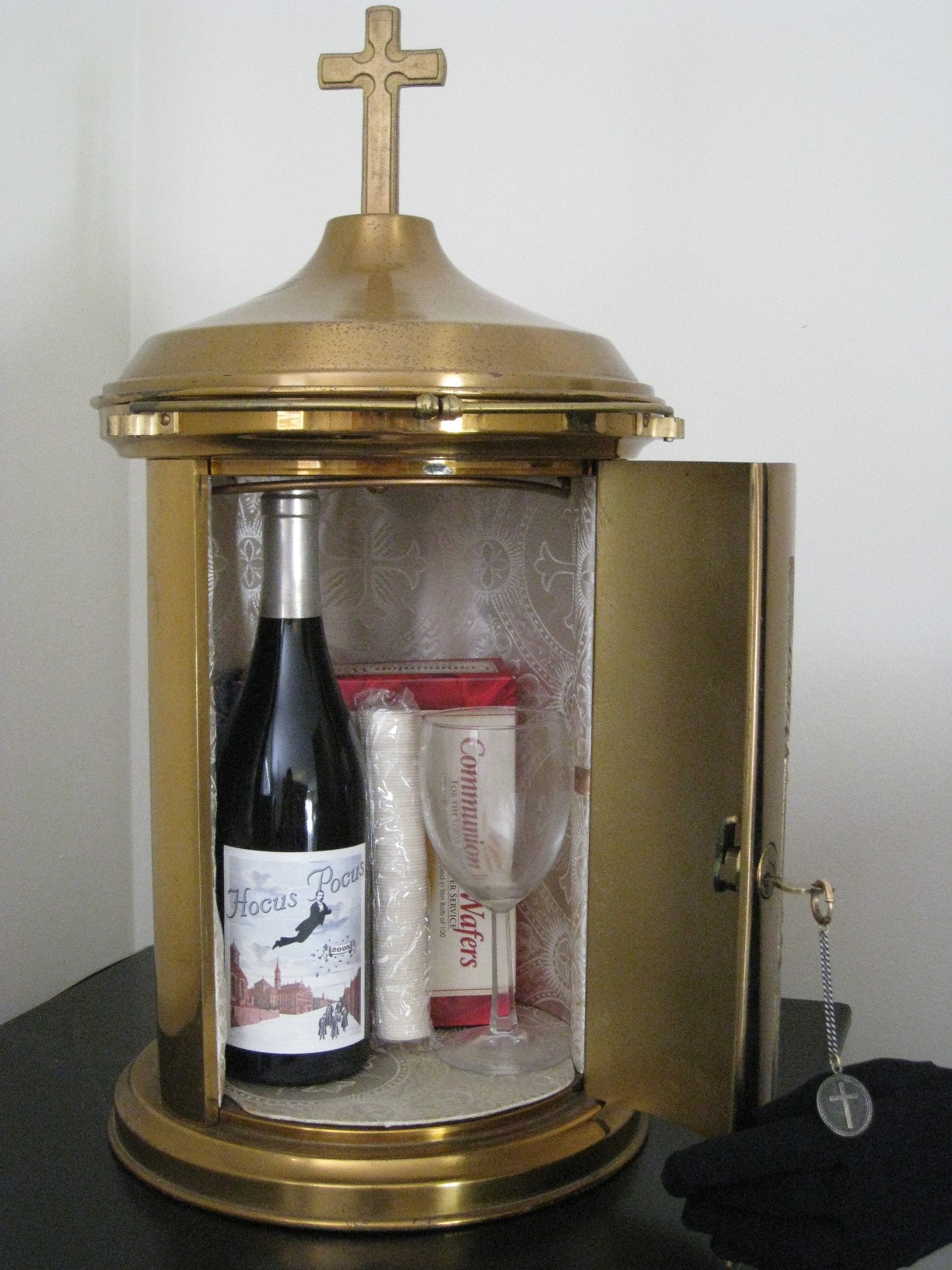
Such is Catholic teaching. I do remember how this reverend bowing before food became more and strange for me when I converted and accepted that the Word of God is the ultimate truth and the Holy Spirit dwells in our hearts. Each time bowing before this sacrament in order not to outrage the people around me I felt very uneasy in my heart, asking: “Almighty God, to whom am I giving a bow?” It was more and more difficult for me to dissemble like that each Sunday till God showed mercy on me and piloted us out form that church that calls itself apostolic.
Catholic teaching about Eucharist is neither teaching of Jesus nor apostolic teaching. Neither Peter, nor Paul, nor John, nor Jude, nor Jacob had ever taught such things in their letters.
Apostle Paul emphasizes that Christians should look at the breaking of bread seriously, because it is not a simple meal. When we take part in the breaking of bread we witness our faith.
1 Corinthians 11, 26:
For as often as ye eat this bread, and drink this cup, ye do shew the Lord’s death till he come.
If you read all the passage about the breaking of bread in 1 Corinthians, chapter 11, you will not find even assumption that there would be any changes of substance in bread or wine.
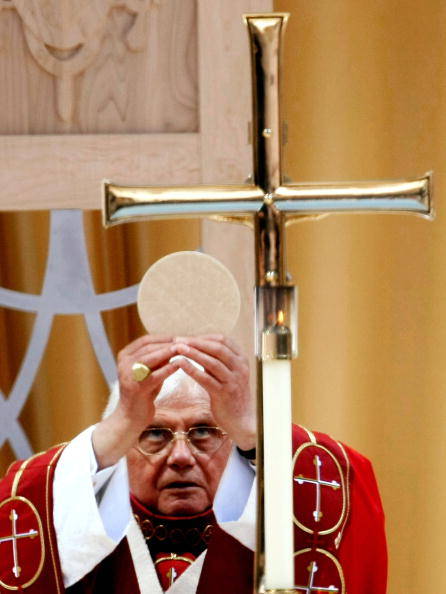
This transubstantiation theory appeared gradually, when traditions became more and more important and without the help of Holy Spirit the Scriptures were understood and explained mistakenly and literally. And now we have a lot of theological articles and studies about so called Eucharist, where naïve childish beliefs in taken out of context lines form the Bible and scholarly Latin phrases are skilfully combined.
For ordinary people the explanation usually is very simple: Jesus told this himself. For those who think this is not enough, the smart scholarly articles are suggested, obviously with intention that their wish to take further interest would be lost. The catholic theologians like high-sounding Latin or Greek words very much.
I am not going to quote these articles; they are difficult for reading and understanding. If you would choose to read some book or article of that kind, you most probably met such words: transubstantiation, consecration, eschatological banquet, epiclesis, anamnesis, doxology, substantially present, divine unity, perichoresis and so on.
All the theological papers lack simplicity, since theology is the study of God and it must be hard to understand as it pertains to higher education.
We can read in 2 Corinthians that Apostle Paul writes about minds that corrupt without simplicity that is in Christ:
2 Corinthians 11, 3-4:
But I fear, lest by any means, as the serpent beguiled Eve through his subtilty, so your minds should be corrupted from the simplicity that is in Christ. For if he that cometh preacheth another Jesus, whom we have not preached, or if ye receive another spirit, which ye have not received, or another gospel, which ye have not accepted, ye might well bear with him.
Unfortunately, many thoughts are now decayed and simplicity got nothing left.
Jesus Christ always spoke very simply; he did not use difficult and subtle words, but spoke straight into people's hearts. When we read the Gospels, we see that Jesus often spoke in parables:
Matthew 13, 34-35:
All these things spake Jesus unto the multitude in parables; and without a parable spake he not unto them: That it might be fulfilled which was spoken by the prophet, saying, I will open my mouth in parables; I will utter things which have been kept secret from the foundation of the world.
Jesus compared himself with the light, the way, the gates and the vine. He said that He is the gates we must get through and the vine we must grow into and bring fruit not to be cast out and things like that.
It is therefore not surprising that He said He was the bread to be eaten, that we can have eternal life.
When Jesus broke the bread, He said, "this is my body" and "this do in remembrance of me", but He did not directed his disciples to repeat certain phrases like magic formulas stretching their hands over a thin piece of bread and a glass of wine or juoce. He did not promised to come like Holy Spirit every time when such rituals will be done, and He did not promised to make the bread and wine into His body and blood every time when these certain phrases are spoken. Moreover Jesus did not directed to His disciples to build a small beautiful house for that thin piece of bread and piously kneel before it. And of course He did not teach that due to ingestion of this thin “holy” wafer every Sunday we are going to reach the Kingdom of Heaven.
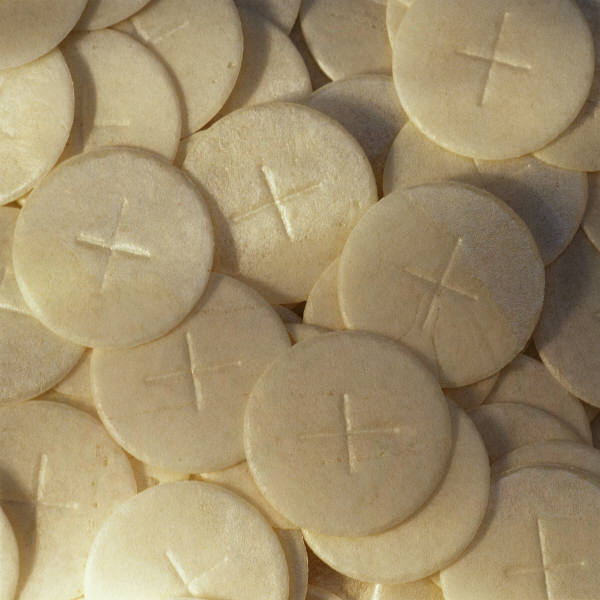
It is very painful for me to see today millions of people perform these rituals hoping to earn salvation in such way. Jesus Christ did not teach that. This is such a huge deception... If this would be a way to enter the Kingdom of Heaven, Jesus revealed to us this, because he loves us so much. But he just said, "Do this in remembrance of me."
Luke 22, 19:
And he took bread, and gave thanks, and brake it, and gave unto them, saying, This is my body which is given for you: this do in remembrance of me.
In these lines Jesus Christ told us himself why we need breaking of bread: in remembrance of Him. Breaking of bread is needed neither for salvation of soul, nor for entering the Kingdom of Heaven, nor for receiving Holy Spirit. Jesus did not teach such things. He did not give any promise about supernatural transformation into bread and vine. We see that Catholic theologians cannot base their teaching about transubstantiation on these words, therefore they quote that Jesus Christ has said:
John 6, 51-58:
I am the living bread which came down from heaven: if any man eat of this bread, he shall live for ever: and the bread that I will give is my flesh, which I will give for the life of the world. The Jews therefore strove among themselves, saying, How can this man give us his flesh to eat? Then Jesus said unto them, Verily, verily, I say unto you, Except ye eat the flesh of the Son of man, and drink his blood, ye have no life in you. Whoso eateth my flesh, and drinketh my blood, hath eternal life; and I will raise him up at the last day. For my flesh is meat indeed, and my blood is drink indeed. He that eateth my flesh, and drinketh my blood, dwelleth in me, and I in him. As the living Father hath sent me, and I live by the Father: so he that eateth me, even he shall live by me. This is that bread which came down from heaven: not as your fathers did eat manna, and are dead: he that eateth of this bread shall live for ever.
Unfortunately, neither Jews 2000 years ago, nor many people today understand what these words of Jesus really mean. The Bible is a spiritual book. If we look through all the Word of God not at the particular place taken out of the context, we can see here that Jesus was not speaking about transubstantiation, not about cakes or loaves of bread, but about spiritual things. The Word of God is that spiritual bread that strengthens us. Faith in Jesus is our spiritual drink:
John 6, 32-35:
Then Jesus said unto them, Verily, verily, I say unto you, Moses gave you not that bread from heaven; but my Father giveth you the true bread from heaven. For the bread of God is he which cometh down from heaven, and giveth life unto the world. Then said they unto him, Lord, evermore give us this bread. And Jesus said unto them, I am the bread of life: he that cometh to me shall never hunger; and he that believeth on me shall never thirst.
Jesus Christ is the Word that became flesh; he is Living Word that gave His life for us.
John 1, 1-4, 14:
In the beginning was the Word, and the Word was with God, and the Word was God. The same was in the beginning with God. All things were made by him; and without him was not any thing made that was made. In him was life; and the life was the light of men.
And the Word was made flesh, and dwelt among us, (and we beheld his glory, the glory as of the only begotten of the Father,) full of grace and truth.
Teaching about transubstantiation and about Jesus Christ miraculously living in Eucharist is a teaching of men from religious organization and this teaching is false and deceptive, leading into further fallacy.
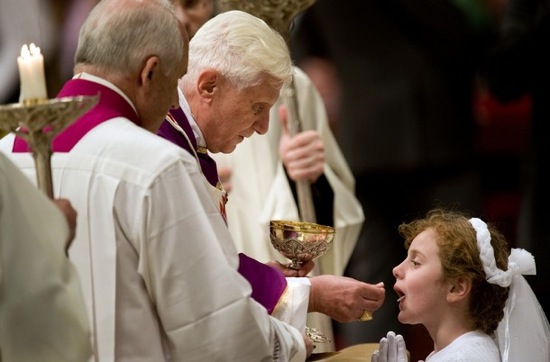
Many other fallacies come from this false persuasion. This worshiping of so called Eucharist is full of ceremonies with ritual phrases and gestures and it is called holy Mass. Such a prominence is given to participation in a Mass ritual that omission of it is called a big sin.
Another teaching appeared that a church building is a house of God, because He lives in co called Eucharist, but we know that it is written in contrary:
Acts 7, 48-49:
Howbeit the most High dwelleth not in temples made with hands; as saith the prophet, Heaven is my throne, and earth is my footstool: what house will ye build me? saith the Lord: or what is the place of my rest?
He lives through the Holy Spirit in our hearts:
1 Corinthians 6, 19:
What? know ye not that your body is the temple of the Holy Ghost which is in you, which ye have of God, and ye are not your own?
Apostle Paul says “which ye have of God”; it is accomplished fact. He does not say: “which you will have by eating body and drinking blood of Jesus Christ“. You can read in the book of Acts how the Holly Spirit is received. Read the Bible and you will see that neither Jesus Christ nor apostles teach that we can receive the Holy Spirit each time we are eating some specially blessed thin cake of bread. Breaking of bread is important and God bless those Christians that honestly and godly participate in Lord’s Supper and He can reveal amongst them. It is said:
Matthew 18, 20:
For where two or three are gathered together in my name, there am I in the midst of them.
Jesus is in the midst of us not in the form of miraculously transformed bread that one can consume and digest. The piece of bread itself means nothing, it cannot give to you the eternal life and it does not matter who and how long prays over it. Jesus said:
John 6, 63:
It is the spirit that quickeneth; the flesh profiteth nothing: the words that I speak unto you, they are spirit, and they are life.
I cannot state that I know the Word of God perfectly and that I have such a great knowledge in Holy Spirit that I can give here comprehensive explanation what the breaking of bread is and what it means.
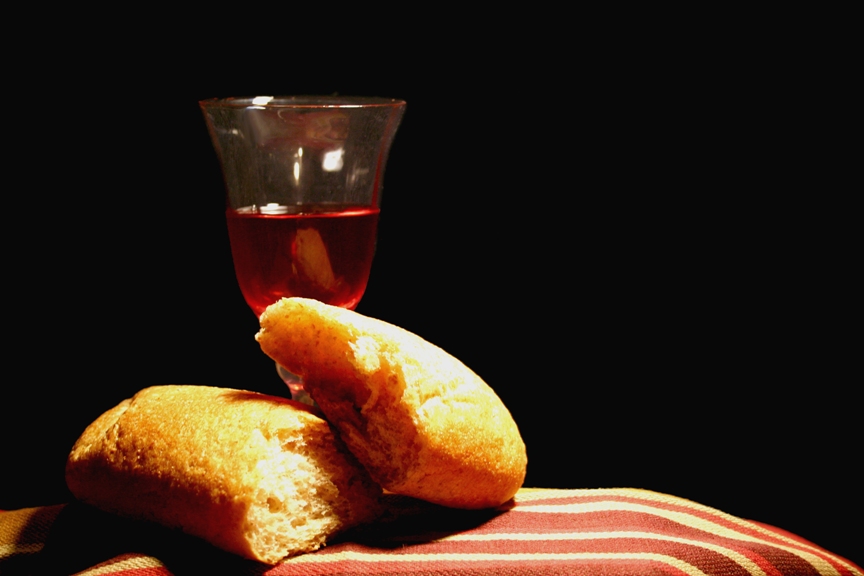
However I am certain that Jesus is neither in bread nor in vine. There are no supernatural transubstantiations during Lord’s Supper, but there may be big transformations in spiritual realm, in our hearts.
And appealing to the Word of God I say that there is no truth in the rituals of Mass. It is said in the Word of God that Jesus had made the only perfect sacrifice and obtained for us eternal redemption. After this perfect sacrifice of His holy blood we do not need to make sacrifices of bread and blood as priests in the times of Old Covenant. Apostle Paul writes:
Hebrews 9, 11-12:
But Christ being come an high priest of good things to come, by a greater and more perfect tabernacle, not made with hands, that is to say, not of this building; Neither by the blood of goats and calves, but by his own blood he entered in once into the holy place, having obtained eternal redemption for us.
Jesus Christ came once for all times and redeemed us and His sacrifice will last for ever. Therefore can be no question about the “making present” of His sacrifice by some ritual words. Jesus Christ had completed all the blood sacrifices on the cross and entered the Kingdom of His Father. He sent the Comforter for us – the Holy Spirit as He had promised and now He is with us always till the end of the world:
John 14, 15-21:
If ye love me, keep my commandments. And I will pray the Father, and he shall give you another Comforter, that he may abide with you for ever; Even the Spirit of truth; whom the world cannot receive, because it seeth him not, neither knoweth him: but ye know him; for he dwelleth with you, and shall be in you. I will not leave you comfortless: I will come to you. Yet a little while, and the world seeth me no more; but ye see me: because I live, ye shall live also. At that day ye shall know that I am in my Father, and ye in me, and I in you. He that hath my commandments, and keepeth them, he it is that loveth me: and he that loveth me shall be loved of my Father, and I will love him, and will manifest myself to him.
Matthew 28, 18-20:
And Jesus came and spake unto them, saying, All power is given unto me in heaven and in earth. Go ye therefore, and teach all nations, baptizing them in the name of the Father, and of the Son, and of the Holy Ghost: Teaching them to observe all things whatsoever I have commanded you: and, lo, I am with you alway, even unto the end of the world. Amen.
We can see from these two places from Scriptures, that Jesus did not command us to celebrate Mass and eat “holy” pieces of bread. He said to His disciples to preach Gospel and baptize other people and to teach these people to observe all things that He commanded. Therefore those who think that they love Jesus, but keep rituals should think again if their love is real. It is impossible to relate celebration so called holy Mass, mingled with pagan rituals, and Jesus Christ’s commandments. Similarly, it is impossible to relate the transubstantiation theory with teachings of apostles. Apostle Paul says:
Hebrews 13, 7-10:
Remember them which have the rule over you, who have spoken unto you the word of God: whose faith follow, considering the end of their conversation. Jesus Christ the same yesterday, and to day, and for ever. Be not carried about with divers and strange doctrines. For it is a good thing that the heart be established with grace; not with meats, which have not profited them that have been occupied therein. We have an altar, whereof they have no right to eat which serve the tabernacle.
Paul speaks here about the new, solely spiritual, altar, where our hearts are established with grace. We know that neither eating nor drinking can bring us closer to God:
Romans 14, 17:
For the kingdom of God is not meat and drink; but righteousness, and peace, and joy in the Holy Ghost.
Those who have faith and belong to Royal priesthood continually sacrifice not special meals but praise to God and do good things to all, because of love and gratitude.
Hebrews 13, 15-16:
By him therefore let us offer the sacrifice of praise to God continually, that is, the fruit of our lips giving thanks to his name. But to do good and to communicate forget not: for with such sacrifices God is well pleased.
Therefore I share this word with everyone who wants it and who can read it. May the Lord bless you and keep you in truth through the Word of God. Let it be His honour and glory for ever. Amen.

